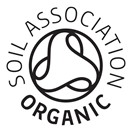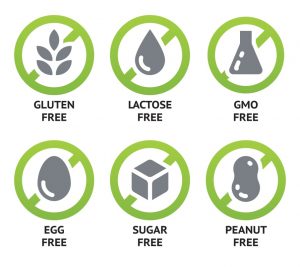 The vast majority of ingredients we use in Amana products have been certified organic (BIO) by the Organic Soil Association.
The vast majority of ingredients we use in Amana products have been certified organic (BIO) by the Organic Soil Association.
EU law ensures that all organic products sold in the EU meets strict standards, shown by the green leaf logo below.
 The Organic Soil Association ensures that the highest possible standards of animal welfare, environmental and wildlife protection. The Organic Soil Association carries out inspections and awards organic certification to businesses that meet the strict standards.
The Organic Soil Association ensures that the highest possible standards of animal welfare, environmental and wildlife protection. The Organic Soil Association carries out inspections and awards organic certification to businesses that meet the strict standards.
What does organic mean?
In recent years, the beauty industry has joined the wellness trend by selling products with terms like “organic,” “natural” and even “chemical-free.”
In chemistry, the term organic describes a class of chemical compounds that formerly comprised only those existing in, or derived from, plants or animals, that now includes all other compounds of carbon.
In farming and food industry, organic means the produce has complied with strict regulations that must apply during the cultivation or animal rearing process, and they can be observed and measured.
However in skincare, if a product contains petrolatum or cetearyl alcohol, it could technically be considered organic in chemical terms since they are derived from carbon-containing substances.
The word organic is a labelling term that indicates that the food or other agricultural product has been produced through approved methods that integrate biological and mechanical practices that promote ecological balance, and conserve biodiversity. Synthetic fertilizers, and genetic engineering may not be used.
Farms and food companies wishing to use the green Organic (BIO) logo on their products must undergo specific procedures, tests and inspections in order to make sure that their products meet the organic standards. This however only applies to raw products of farming and plant cultivation.
Once the plant of mushroom undergoes an extraction process, technically its molecular structure is altered in order to be safely and effectively used in cosmetic products.
Why does it matter then to use organic skincare?
When we use skincare products that are made up of pure, clean, organic certified ingredients, we significantly reduce the risk of skin irritation, allergies and blemishes.
Non-organic ingredients might contain traces of pesticides, heavy metals and other pollutants, that might transfer through the epidermis directly into the blood stream. This in turn, might impact our general health, over time.
Organic skincare is not only better for the skin, for the environment, animal welfare and planet earth. It is also much better for our general health as certain skincare particles permeate the epidermis and end up in our blood stream.


 Of course none of the Amana products were tested on animals.
Of course none of the Amana products were tested on animals.
